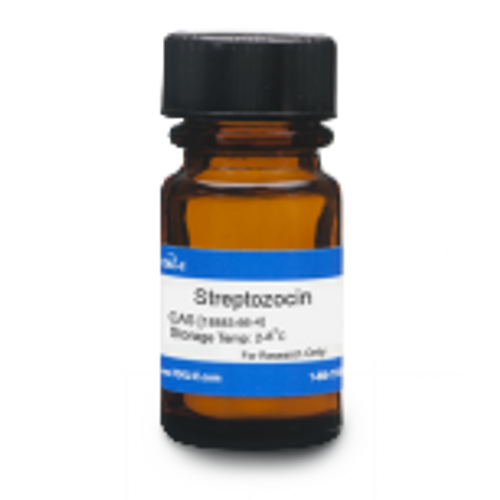Streptozocin is an anti-tumor agent commonly used in metastatic cancer of pancreatic islet cells. It is a glucosamine-nitrosourea. Streptozocin was discovered in soil microbe Streptomyces achromogenes at Upjohn (now Pfizer). It targets mammalian pancreatic islets beta cells and causes DNA alkylation. These cells produce insulin thus it can be used in animal models of diabetes. DNA damages in turn causes activation of polyAPD-ribosylation, leading to beta cell destruction. The level of activity depends on GLUT2 expression level.
Streptozocin is freely soluble in aqueous solution.
| Mechanism of Action | Streptozocin acts as an alkylating agent which damages DNA by adding methyl and other alkyl groups which interfere with normal base pairing. |
| Impurity Profile | α-isomer: ≥75.0% Residue on Ignition: ≤0.1% Heavy Metals: ≤20ppm |
| Eukaryotic Cell Culture Applications | Streptozocin is frequently used to induce diabetes and insulitis for diabetes research in mammalian models. Streptozocin (TOKU-E) was used in a study by Xufeng et al. : Effects of Radix linderae extracts on a mouse model of diabetic bladder dysfunction in later decompensated phase |
| Cancer Applications | Streptozocin has shown to decrease tumor size and relevant tumor-induced symptoms including hypoglycemia. |
| Molecular Formula | C8H15N3O7 |
| References |
Broder LE and Carter SK (1973) Pancreatic islet cell carcinoma. II. Results of therapy with Streptozotocin in 52 patients. Ann. Intern. Med 179:108–118 Moertel CG, Hanley JA and Johnson LA (1980) Streptozocin alone compared with Streptozocin plus fluorouracil in the treatment of advanced islet-cell carcinoma . N. Eng. J Med. 303:1189–1194 Murray-Lyon IM et al (1968) Treatment of multiple-hormone-producing malignant islet-cell tumour with Streptozotocin. Lancet 2 (7574):895–898 |



